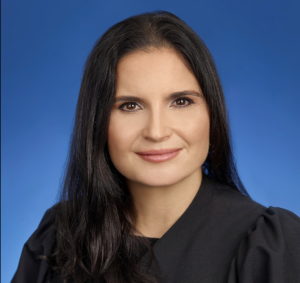[ad_1]
 This morning Judge Aileen Cannon did Donald Trump a solid and denied his motion to delay the May 20, 2024 trial date in the documents case.
This morning Judge Aileen Cannon did Donald Trump a solid and denied his motion to delay the May 20, 2024 trial date in the documents case.
Well, sort of.
The judge began her brief order by formally refusing the request to postpone the day of reckoning. This would appear on the surface to be a loss for the former president, if it hadn’t been immediately followed by a delay of deadlines in this case such that it will be nigh impossible to go ahead with the trial as scheduled. For instance, a hearing on compliance with § 4 of the Classified Information Procedures Act (CIPA) which was originally set for October 17 “if necessary,” was moved to February 15 and 16.
As Lawfare’s Roger Parloff points out on Twitter, this strongly suggests that Judge Cannon is gearing up for a protracted dispute over the classified documents Trump stole and stashed in a storage locker at Mar-a-Lago, allowing Trump latitude to engage in exactly the “graymail” CIPA was designed to prevent.
CIPA § 4 lays out an ex parte review process for when the government seeks to withhold classified evidence from the defense. But in her November 1 order staying the CIPA deadlines, Judge Cannon suggested that this fight was only “potentially on an ex parte basis.” In contrast, Judge Tanya Chutkan, who is presiding over the election interference case in DC, brushed aside Trump’s attempt to intrude on the § 4 hearing, writing that “the defense identifies no case in which any court has ordered the relief they seek here, and this court is aware of none.”
Moreover, the ruling last week with respect to Trump’s co-defendants Walt Nauta and Carlos De Oliveira highlights Judge Cannon’s plan to let Trump leverage CIPA to extract delay. In that round, prosecutors sought to deny the valet and groundskeeper access to classified evidence, since knowing what secrets were in the boxes they shifted around to evade subpoena isn’t germane to their defense to lying to the feds about it. But the court refused, ordering the government to argue through the CIPA § 4 process against disclosing each classified document to Trump’s hapless goons. So in essence, the judge put the rabbit in the hat here, ensuring that the fight will be protracted and onerous — and then moving it to just a few weeks before the scheduled trial date, at which point she can throw up her hands and claim that she simply has to postpone.
Judge Cannon further tips her hand by giving credence to Trump’s complaints about voluminous discovery.
“Defense counsel advised during the November 1, 2023, hearing that data stored in the folders downloads and processes at a very slow rate, making review cumbersome, and requiring additional equipment,” she murmurs sympathetically, while tut-tutting that the government failed to designate a SCIF in Miami before indicting the former president for stealing classified documents.
Judge Cannon has putatively calendared a scheduling conference for March 1, just three days before the start date for the DC case, “to address remaining deadlines in a reasoned manner.” And that if this case was being heard by a jurist who didn’t attempt to derail it in 2022, before being humiliatingly slapped down by the 11th Circuit, no one would bat an eye. But taken in light of everything we’ve seen, it’s clear that prosecutors are going to have to take an interlocutory appeal to the 11th Circuit if they want to protect classified evidence. At which point, Judge Cannon can postpone this trial until after the election and blame the government.
And in case it wasn’t clear who won today, Trump’s spokesman Steven Cheung confirmed it.
“We look forward to the conference set by Judge Cannon for next March, where future scheduling matters, including a potential trial date, will be discussed,” he crowed, adding “It is clearly in the best interest of Justice for President Trump to have adequate time to prepare and file motions as he works to defeat these hoaxes and marches back to the White House.”
US v. Trump [SDFL Docket via Court Listener]
US v. Trump [DDC Docket via Court Listener]
Liz Dye lives in Baltimore where she writes about law and politics and appears on the Opening Arguments podcast.
[ad_2]



